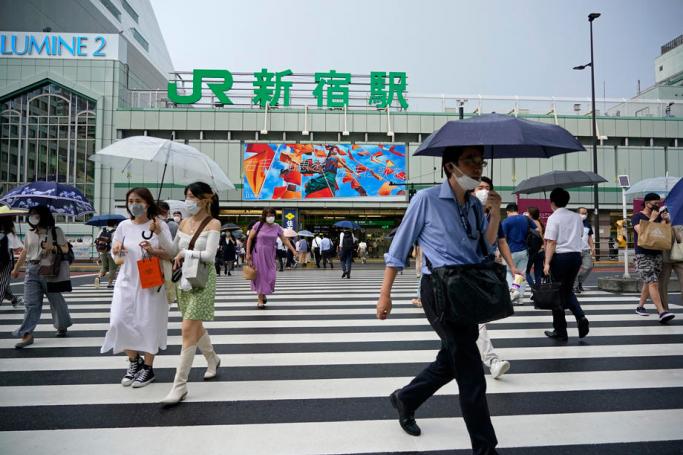Fears over a spike in coronavirus infections around the world, the reimposition of containment measures and China-US tensions pushed Asian equities lower Tuesday, while oil prices were also hit by speculation top producers will begin tapering their output cuts.
And news that Singapore's economy, considered a regional barometer, contracted a mind-boggling 41 percent in the second quarter provided a stark reality-check for traders.
After hitting lows in March, markets have been surging thanks to government support and optimism that the world economy will bounce back as crippling lockdowns are eased.
But a worrying increase in new virus cases across the planet has forced governments to revert to measures aimed at preventing the disease's spread.
California, the richest of the US states, ordered all indoor restaurants, bars and movie theatres to re-close, while churches, gyms, shopping malls, hair salons and non-essential offices have been told to shut up shop in several densely populated counties, including Los Angeles.
The measures follow new restrictions imposed in Texas, Arizona, Florida and other major states.
Meanwhile, Hong Kong on Monday announced sweeping new curbs as the city suffers a relapse. Melbourne is already under a new lockdown and there are signs of new outbreaks in Sydney.
The new spikes come as World Health Organization chief Tedros Adhanom Ghebreyesus warned: "There will be no return to the 'old normal' for the foreseeable future."
He added that without governments adopting a comprehensive strategy, the situation would get "worse and worse and worse".
The developments overshadowed an announcement from Pfizer and BioNTech that two of four vaccine candidates for the virus had received "Fast Track" designation from the US Food and Drug Administration.
- Singapore agony -
Asian markets tracked a weak lead from Wall Street.
Hong Kong fell more than one percent, Shanghai dropped 0.8 percent and Tokyo lost 0.9 percent.
Sydney fell 0.6 percent, Seoul was off 0.1 percent, Mumbai shed two percent and Bangkok eased 0.9 percent.
Taipei, Jakarta and Manila were all flat but Wellington was up 0.5 percent.
Singapore was 0.2 percent down after figures showed the city-state's trade-dependent economy plunged into recession for the first time in a decade as it contracted a record 41.2 percent on-quarter in April-June and 12.6 percent on-year.
The worse-than-expected figures will ring alarm bells for Asia's many trade-dependent economies as Singapore is typically hit first before ripples spread across the region.
London was 0.7 percent down after news that Britain's economy contracted by almost a fifth in the three months to May, compared with December-February. Frankfurt and Paris each lost more than one percent.
"There is a risk that the divergence between a gloomy economic outlook and unexpectedly strong returns from equity markets is reconciled by some pull-back in asset prices rather than a surge in economic optimism," said Chris Iggo at AXA Investment Managers. "There is a case for caution."
Geopolitical tensions were also back on the table after US Secretary of State Mike Pompeo called China's pursuit of resources in the South China Sea "unlawful", ramping up support for Southeast Asian nations and triggering an angry response from Beijing.
The comments added to a laundry list of issues that have the two economic superpowers at odds, including China's role in the pandemic, trade, Hong Kong and tech giant Huawei.
"The US relationship with China and jobs and law-and-order form the troika of issues that will serve as the primary platform for President Trump's re-election campaign," said Stephen Innes at AxiCorp.
"Growing US-China tensions are now a daily breakfast staple and will likely remain so into the November election."
Oil markets dropped as new lockdowns fuel concerns about demand, while focus is on this week's technical gathering of key crude producers inside and outside OPEC who are expected to roll back production cuts.
The group will discuss its 10-million-barrels-a-day cut in production that was agreed earlier this month to support prices as they plunged to record lows, with speculation the figure could be tapered to around 7.7 million.
There was some good news Tuesday in data showing Chinese exports and imports grew in June, having plunged the month before, as the world's number two economy emerges from the crisis.
The figures come days before the release of data expected to show GDP returned to expansion in April-June after a deep contraction in the previous quarter.
© AFP












